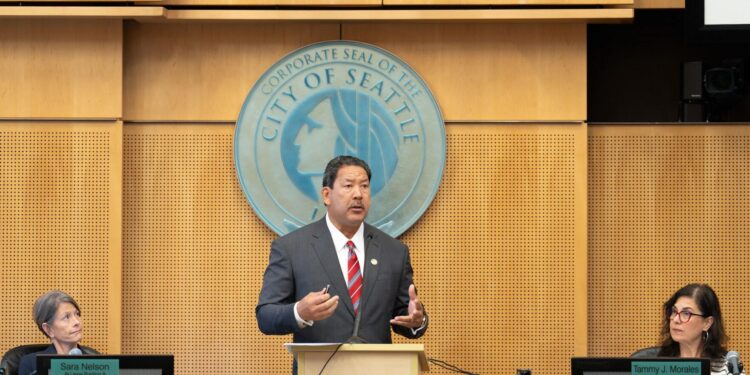Mayor Bruce Harrell unveiled budget proposals Monday designed to protect immigrant services and social programs as Seattle prepares for potential federal funding reductions under the Trump administration’s policy changes.
The city faces losing hundreds of millions in federal dollars as immigration enforcement intensifies and support for food access, housing, and essential services faces cuts. Harrell positioned Seattle’s response as defending community values despite federal policy shifts.
“They target our immigrant and refugee neighbors and slash federal support to vital services, something as simple as how one can eat,” Harrell said. “Seattle is choosing to stand with our communities and our values.”
The mayor’s proposal includes $4 million in additional funding for immigrant and refugee services, representing a 60 percent increase to the Office of Immigrant and Refugee Affairs budget. The investment would expand work placement assistance, housing support, and legal aid programs.
“Budgets are a moral document. They say what our values are,” said Hamdi Mohamed, OIRA director. “That is what this $4 million investment represents for our Office of Immigrant and Refugee Affairs, a commitment to rapid response when families are facing crisis.”
Homeless services would receive $9.3 million for emergency shelter operations and hotel voucher programs, with an additional $4 million allocated for rental assistance. Kelly Kinnison, CEO of the King County Regional Homelessness Authority, emphasized the immediate impact of shelter funding.
“This shelter meets the immediate need of unhoused people it brings them indoors out of the elements and puts them on the path to rebuilding their lives,” Kinnison explained.
Food assistance programs would also see increased investment as the mayor commits to maintaining safety net services previously supported by federal funding.
“These investments are part of a larger strategy in our proposed 2026 budget, backfilling again essential services threatened by these federal cuts,” Harrell stated.
Funding for the expanded programs depends on voter approval of the Seattle Shield Initiative, which would restructure business and occupation taxes. The measure increases contributions from larger companies while providing tax relief for small businesses.
“We cannot control what happens in Washington, D.C., but Seattle can choose to boldly stand up to defend our values, to shield our small businesses and our neighbors,” said City Councilmember Alexis Mercedes Rinck, who championed the initiative.
The Shield Initiative appears on November’s ballot and would generate $80 million annually. Passage is essential to Harrell’s 2026 budget strategy, which he will formally announce Tuesday.
The proposal reflects Seattle’s approach to maintaining local social services despite federal policy changes, positioning the city as a bulwark against reduced federal support for vulnerable populations.







